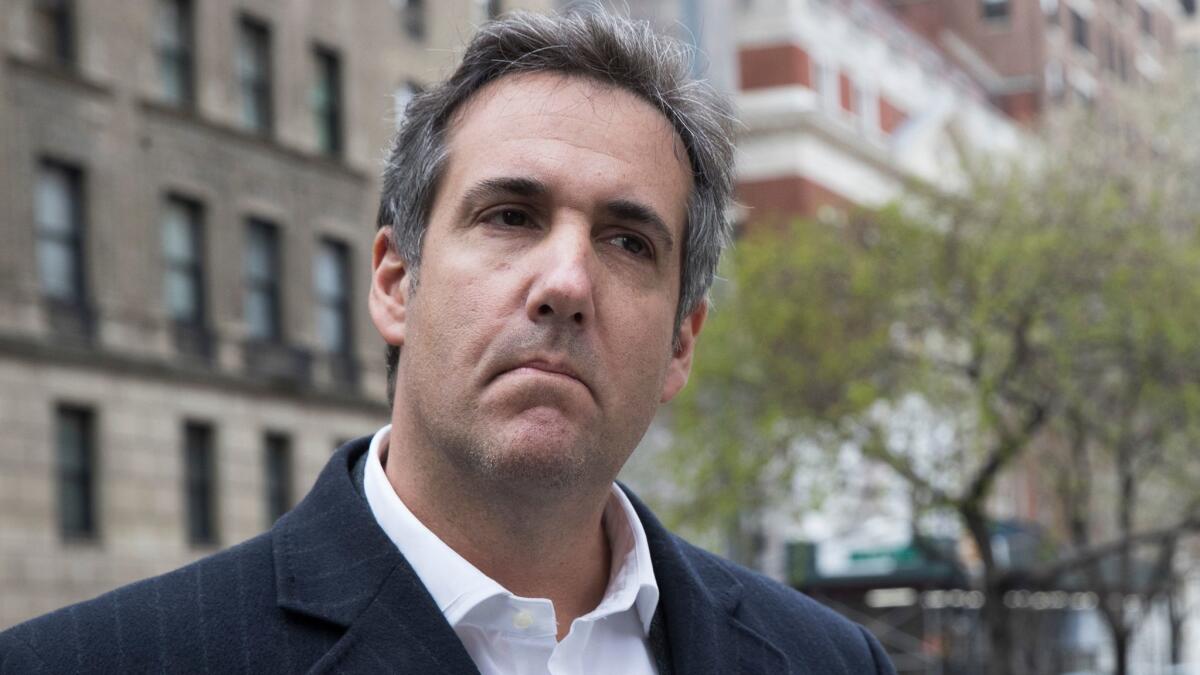Column: When #MeToo and the Russia investigation collide

- Share via
This last year has been a crash course in startlingly brutal abuses of power. For decades, it seems, a caste of self-styled overmen has felt liberated to commit misdeeds with impunity: ethical, sexual, financial and otherwise.
There’s hardly room to name them all here, though of course icons of power-madness such as Donald Trump and Harvey Weinstein are household names. In plain sight, even more or less regular schmos — including EPA administrator Scott Pruitt, disgraced carnival barker Bill O’Reilly and former New York Atty. Gen. Eric Schneiderman — seem to have fancied themselves exempt from the laws that bind the rest of us.
These guys are not exactly men of Nobel-level accomplishment or royal blood. Like the rest of us, they live in a democracy, under rule of law. Still, they like to preen. How exciting this VIP cosplay must be for them! Dudes from Queens or Oklahoma get to behave like twisted aristocrats in the tradition of Henry VIII or the Marquis de Sade.
The courageous #MeToo movement, which brought forth Schneiderman’s accusers, has been proxy and practice for the exposure of some in Trump’s circle, including their ties to Russia. But now the biggest stories of abuse of power — #MeToo offenders and the Russia-aligned Trump syndicate — have become one. And if the fast and furious revelations are any indication, a reckoning for the broader overman racket may also be at hand.
On Monday, a detailed account of Schneiderman’s alleged history of strangling, slapping and boxing the ears of his girlfriends appeared in the New Yorker, prompting the attorney general to resign the next day.
On Friday, a legal document surfaced that suggested Donald Trump and Michael Cohen, his erstwhile personal lawyer, might have known about Schneiderman’s propensity for sexual violence as early as 2013, when Trump tweeted menacingly about Schneiderman’s being a crook, soon to go the way of disgraced American politicians Eliot Spitzer and Anthony Weiner.
The orderly enforcement of the law has, ludicrously, been framed as political.
Also this week, news broke that Cohen, known for servicing the hush-money-extramarital-affairs needs of Trump and Republican National Committee official Elliott Broidy, was also taking fat stacks of money from Columbus Nova, a family-investment office with ties to Viktor Vekselberg, a Russian oligarch.
(Sidebar because it’s just this insane: Was Broidy actually taking the heat for Trump when he copped to an affair and pregnancy with a skin-mag model? Did Broidy give Cohen money not to hush things up but rather as a way of currying favor with the president? Law professor Paul Campos laid out that case hypothetically but persuasively in New York magazine, also this week.)
Cohen’s office also saw big sums from blue-chip companies not known for “Sopranos”-style nonsense, specifically, Novartis and AT&T. On Friday morning, the CEOs of Novartis and AT&T apologized for getting mixed up with Cohen. AT&T’s CEO said hiring him was “a big mistake.” (I bet.)
Oh, but it doesn’t stop there. Also this week, the Observer alleged that Trump confederates hired the same gang of former Israeli intelligence officers to frame and intimidate proponents of the Iran deal that Harvey Weinstein once viciously sicced on his victims. The ex-spies, known as Black Cube, denied any connection to the administration.
It’s important to note, in a time monotonously described as intensely partisan, that the men involved in these antics come in every ideological stripe. Some are feminists. Some are libertarians. Some are climate deniers. All appear to be in chronic violation of baseline codes of conduct.
Law professor Alan Dershowitz’s new book claims that political differences have lately been criminalized in the United States. He has it wrong. Instead, the orderly enforcement of the law has, ludicrously, been framed as political.
A cottage industry of enablers has risen alongside the above-the-law caste. These are the joints like Black Cube, Cambridge Analytica and Cohen’s nutty consultancy LLC. Swank outfits that for a steep price protect the swaggering VIPs, and in some cases make problems go away.
Swashbuckling tactics at such concerns might include humiliating a client’s rivals, exes and whistleblowers; concealing his misdeeds; manipulating media and social media; and perhaps coarser services.
Everyone involved wears suits, and they operate under the rubric of “research” or “strategic communication.” Cohen said he would offer “insights” into ... something for his corporate clients.
Like their clients, these concerns look impressive while they last — surely something brought AT&T to the table with Cohen — but they can go from riches to rags overnight. Cambridge Analytica and the Cohen consultancy, for example, are now defunct.
They sure do savor it while they can, appropriating government functions — running private intelligence, private security and even, in the case of Trump associate Erik Prince’s Blackwater, private military operations.
Perhaps this whole network believes, as Schneiderman reportedly told one of the women who has accused him of abuse: “I am the law.”
As prosecutors and journalists close in, the actual law seems to have other ideas.
Twitter:@page88
Follow the Opinion section on Twitter @latimesopinion and Facebook.
More to Read
A cure for the common opinion
Get thought-provoking perspectives with our weekly newsletter.
You may occasionally receive promotional content from the Los Angeles Times.






